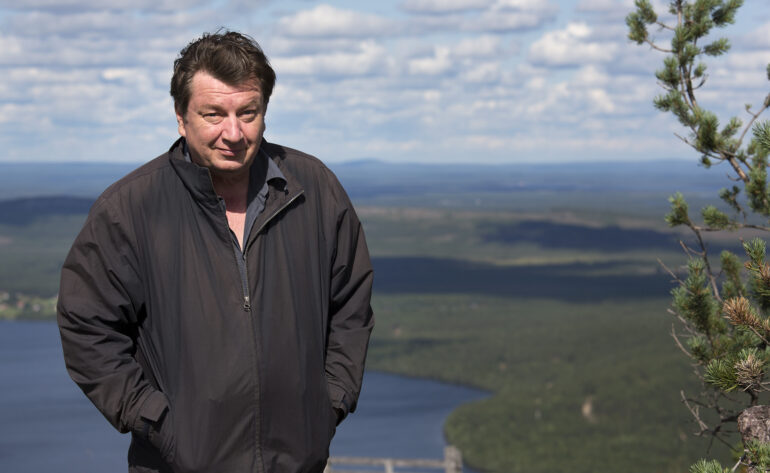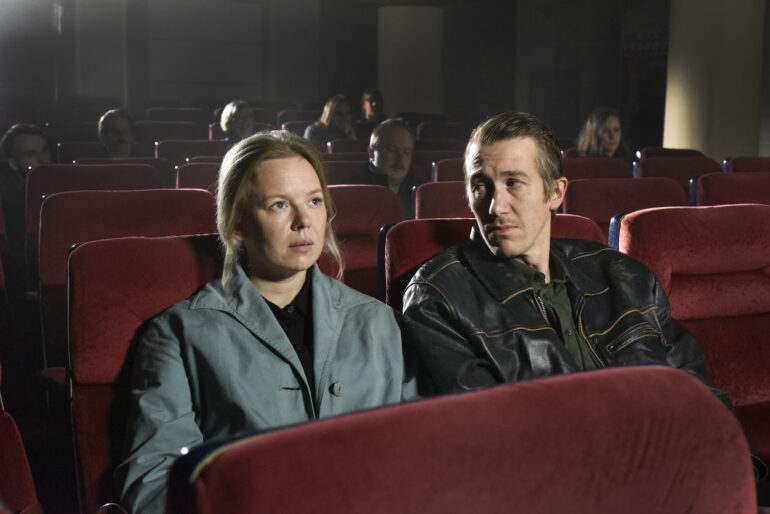WRITTEN BY: Marta Balaga
Legendary – and legendarily laconic – Finnish filmmaker talks Fallen Leaves and love stories.
Ever since its Cannes premiere, when it won the Jury Prize, audiences all over the world have been falling for Aki Kaurismäki’s Fallen Leaves (Kuolleet lehdet). His latest film is a gentle love story about two loners, Ansa and Holappa (Alma Pöysti and Jussi Vatanen), who slowly start to believe their lives might be finally changing for the better. They just have to make sure they won’t let go of each other, despite all their hardships, misunderstandings and accidents, or of the dog called Chaplin.
Set in Helsinki and nominated for the Nordic Council Film Prize 2024, representing Finland, it was produced by Kaurismäki for Sputnik and Misha Jaari and Mark Lwoff for Bufo, and co-produced by Germany’s Pandora Film. Fallen Leaves was shortlisted for Best International Feature Film Academy Award, with Alma Pöysti also scoring a nomination for a Golden Globe. The Match Factory handles sales.
Sometimes it feels like your universe doesn’t change, but it does: You reference the refugee crisis or Ukraine. How do you combine it all? Also, I’ve heard people describing your films as sad, but you never forget about hope.
Of my about 20 feature-length films, only five or six are dealing with this “universe”. The rest are totally different. Not reacting to the endless crisis of our common universe would be morally lazy.
When all the hope is gone, there is no time for pessimism.
I think that people are afraid of love stories these days. Why aren’t you?
Cinema is still based on love stories. They make up from 70 to 75% [of all productions]. All the early Charlie Chaplin, Buster Keaton and Harold Lloyd films told of nothing else. The Marx Brothers, though, had a different point of view.
Without the so-called love story, my two characters would be sad and lonely from the beginning to the end, and that wouldn’t be highly commercial. Says the producer part of me.
Do you think showing that love is possible even between two lonely nobodies is inspiring? We are done with romantic comedies featuring glamorous stars, I guess.
The day love is not possible anymore we are finally and totally lost. The glamorous stars I leave to Hollywood, which is dead anyway.
Do you expect actors, including Alma and Jussi, to fit into your style, or do you allow them more freedom?
I simply want the actors to follow the screenplay. The only thing I can’t, and don’t want to control, is their eyes.
Why did you want to include so many filmmakers and the Finnish film industry in the film? Nobody outside of Finland will realise that, but it made me laugh.
They should, at least once in a lifetime, be in front of the camera. Partly because of the historical documentation, partly because with them, I didn’t have to follow the rules of the salaries of the actors’ union. This way, they participated in giving me a chance to pay real actors better. And that’s only fair.
One thing is for sure. Someone says: “Finnish cinema.” People reply: “Aki Kaurismäki.” Is there a lot of pressure related to being your country’s best-known director? And is it satisfying to still be nominated for awards like these?
In the last few years, I have fortunately got some company.
Anyhow, my style is the only one I have, and therefore the only one I can use. It has, maybe luckily, brought my films some “success”, but that is not so important as long I know the films are OK, considering my limited skills. Not to be nominated would be slightly sad. I’m still human.
Official trailer:
The film will be screened at Helsinki International Film Festival and NCFP events in Copenhagen, Stockholm and Reykjavík. To read more about Fallen Leaves: CLICK HERE.
The Film Prize was first awarded in 2002 and then permanently established in 2005, and is to be juxtaposed with the Nordic Council Literature Prize, the Children & Young People's Literature Prize, the Music Prize, and the Environment Prize. The winner of the prizes will be announced October 22 via RÚV.

